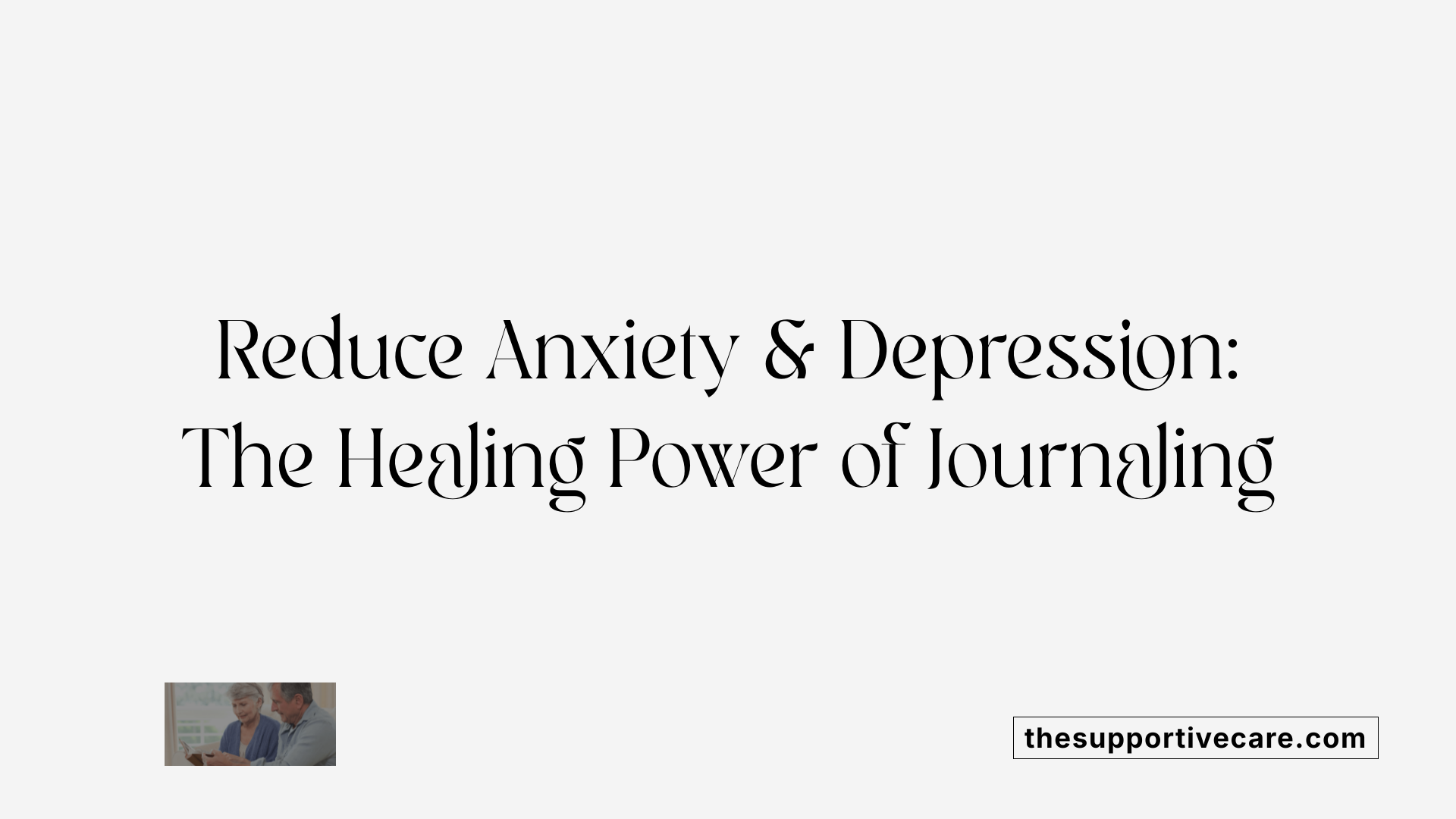The Power of Journaling in Senior Mental Health
As people age, maintaining mental health becomes increasingly important, especially in managing conditions like anxiety and depression. One accessible and effective tool that has gained recognition in both clinical and personal settings is journaling. This article explores how journaling supports emotional well-being in seniors, highlighting various techniques, scientific findings, and practical tips to incorporate this practice into daily life.
The Therapeutic Role of Journaling in Mental Health Management
How can journaling support mental health in older adults?
Journaling offers numerous benefits for seniors, serving as a simple yet powerful tool to promote emotional well-being. It provides a safe space for older adults to process their thoughts and feelings, helping to alleviate stress and manage symptoms of anxiety and depression. Writing about worries or traumatic experiences can help seniors offload difficult emotions, reducing their overall mental distress.
In addition to emotional support, journaling stimulates cognitive functions such as recall, problem-solving, and critical thinking. Regular reflective writing can enhance memory, sharpen mental acuity, and help maintain cognitive health as people age. Different styles of journaling, including gratitude journals or memory logs, can boost happiness, foster a sense of purpose, and support emotional healing.
Journaling also encourages self-awareness, helping seniors better understand their emotions, values, and personal growth. When shared or discussed within social groups, it can strengthen social ties and combat loneliness. Overall, evidence suggests that consistent journaling can positively influence mental health, acting as an effective complementary approach to traditional therapies for older adults.
Physical and Cognitive Benefits of Journaling for Older Adults

How does journaling benefit the mental health of older adults?
Journaling offers many advantages for the mental health of seniors. It serves as a safe space where they can express their emotions and thoughts, helping to lessen feelings of anxiety and depression. By writing about worries, frustrations, or traumatic experiences, seniors can offload emotional burdens, which contributes to emotional regulation and well-being.
Engaging in regular journaling also stimulates cognitive functions. Activities like memory journaling and reflective writing help improve recall, develop problem-solving skills, and encourage critical thinking. These mental exercises support maintaining mental agility that tends to decline with age.
Practicing gratitude through journaling often results in enhanced mood and greater optimism. This can fight loneliness and foster a deeper sense of purpose and self-worth. Many older adults find that writing about their life achievements and personal stories helps them preserve their identity, formulate a sense of legacy, and maintain a positive outlook.
Overall, journaling is a flexible, cost-effective activity that promotes emotional healing, cognitive sharpness, and life satisfaction. Its ability to foster mindfulness, emotional processing, and memory makes it especially beneficial for older adults aiming to sustain mental and emotional vitality.
Techniques and Methods to Foster Emotional Resilience

What are effective journaling techniques for supporting emotional well-being in seniors?
For seniors, engaging in various journaling techniques can significantly boost emotional health. Common methods include free writing, where individuals jot down thoughts spontaneously to unload emotions and reduce stress. Guided prompts are also helpful; these are specific questions or themes that encourage reflection on meaningful memories, personal lessons, or sources of gratitude, fostering a positive outlook.
Gratitude journaling, where seniors note daily things they are thankful for, can enhance mood and promote happiness. Memory journaling allows seniors to revisit and record cherished moments, strengthening cognitive skills and a sense of continuity. Creative activities like drawing, poetry, or storytelling embedded within journaling can make the practice more engaging and stimulate artistic expression.
Establishing a consistent routine is essential. Setting aside a specific time each day or week in a cozy, quiet space helps form a habit that employees long-term mental health benefits. Using special journals or notebooks tailored to personal preferences can also make the process more enjoyable.
Beyond solitary practice, sharing journal entries with trusted friends, family, or community groups can foster social bonds. This openness can help a senior feel supported and connected, which is vital for emotional resilience. Group journaling sessions or writing clubs provide opportunities for social engagement and collective reflection.
By incorporating these techniques, seniors can create a safe space for emotional expression, better manage anxiety and depression, and cultivate a resilient, positive mindset in daily life.
Impact of Journaling on Anxiety and Depression

What is the impact of journaling on reducing anxiety and depression among seniors?
Research shows that journaling has a positive effect on managing anxiety and depression in older adults. Several studies, including systematic reviews and meta-analyses, reveal that engaging in regular writing activities can lead to reductions in symptoms of mental distress. Journaling provides a safe space for seniors to express their deepest feelings, process unresolved emotions, and reflect on life experiences.
Expressive writing—about one’s thoughts and feelings for about 20 minutes over multiple sessions—has been linked to significant improvements in emotional well-being. Techniques like gratitude journaling, where individuals focus on positive aspects of their lives, can boost mood and enhance overall happiness. These practices help seniors reframe negative emotions, gain new perspectives, and build emotional resilience.
While the extent of benefits varies across different studies, the general trend indicates that journaling helps alleviate feelings of anxiety and depression. Its low cost, ease of implementation, and minimal risks make it an attractive option in primary care and community settings. As an adjunct therapy, journaling supports emotional regulation and provides a constructive outlet for emotional expression.
In conclusion, encouraging journaling can be a valuable component of mental health management for seniors. It fosters a sense of purpose, promotes mindfulness, and offers tangible emotional relief, ultimately contributing to better overall mental health for aging populations.
Practical Strategies to Initiate and Sustain Journaling in Older Adults

Choosing journals and writing materials
Starting a journaling habit begins with selecting the right tools. Seniors should choose a comfortable, easy-to-handle journal or notebook, perhaps with large pages or a spiral binding for ease of use. Using a pen that feels comfortable and writes smoothly can make the activity more enjoyable. Some may prefer guided journals with prompts or memory books tailored for reflection or gratitude.
Building routines and setting realistic goals
Consistency is important, so establishing a regular routine helps make journaling a sustainable practice. Seniors might start with just five minutes a day or a few times a week, gradually increasing as they become more comfortable. Using reminders or setting specific times—such as after breakfast or before bed—can foster habit formation. Small, achievable goals keep the activity enjoyable and prevent feeling overwhelmed.
Involving community or family support
Supportive environments enhance motivation and accountability. Family members or friends can encourage journaling by participating together or sharing positive feedback. Joining group sessions, writing clubs, or online communities for seniors can also foster camaraderie and provide new ideas. This social aspect not only sustains the habit but also helps seniors feel connected and supported in their mental health journey.
| Step | Action Item | Additional Tip |
|---|---|---|
| 1 | Choose a suitable journal and pen | Opt for materials that are comfortable and accessible |
| 2 | Set a specific time for journaling | Embed it into daily routine for consistency |
| 3 | Start with small, manageable goals | Gradually increase writing sessions to build habit |
| 4 | Engage with family, friends, or groups | Share reflections or participate in collective activities |
Fostering Hope and Resilience Through the Pen
Incorporating journaling into daily routines offers a simple yet powerful way for seniors to enhance emotional health, reduce feelings of loneliness, and foster a sense of purpose. As evidence accumulates on its benefits, it becomes clear that this accessible activity can serve as a meaningful complement to traditional therapies, helping older adults navigate the challenges of aging with resilience, hope, and greater well-being.
References
- Efficacy of journaling in the management of mental illness
- Journaling for Seniors: A Path to Mental Wellness and ...
- How Journaling Benefits Seniors' Mental Health
- Journaling for Emotional Wellness
- Mental Health Benefits of Journaling
- Journaling for Anxiety
- Efficacy of journaling in the management of mental illness
- Mental Health Benefits of Journaling
- Journaling for Seniors: A Path to Mental Wellness ... - Eden East
- Online Positive Affect Journaling in the Improvement ...



































































































